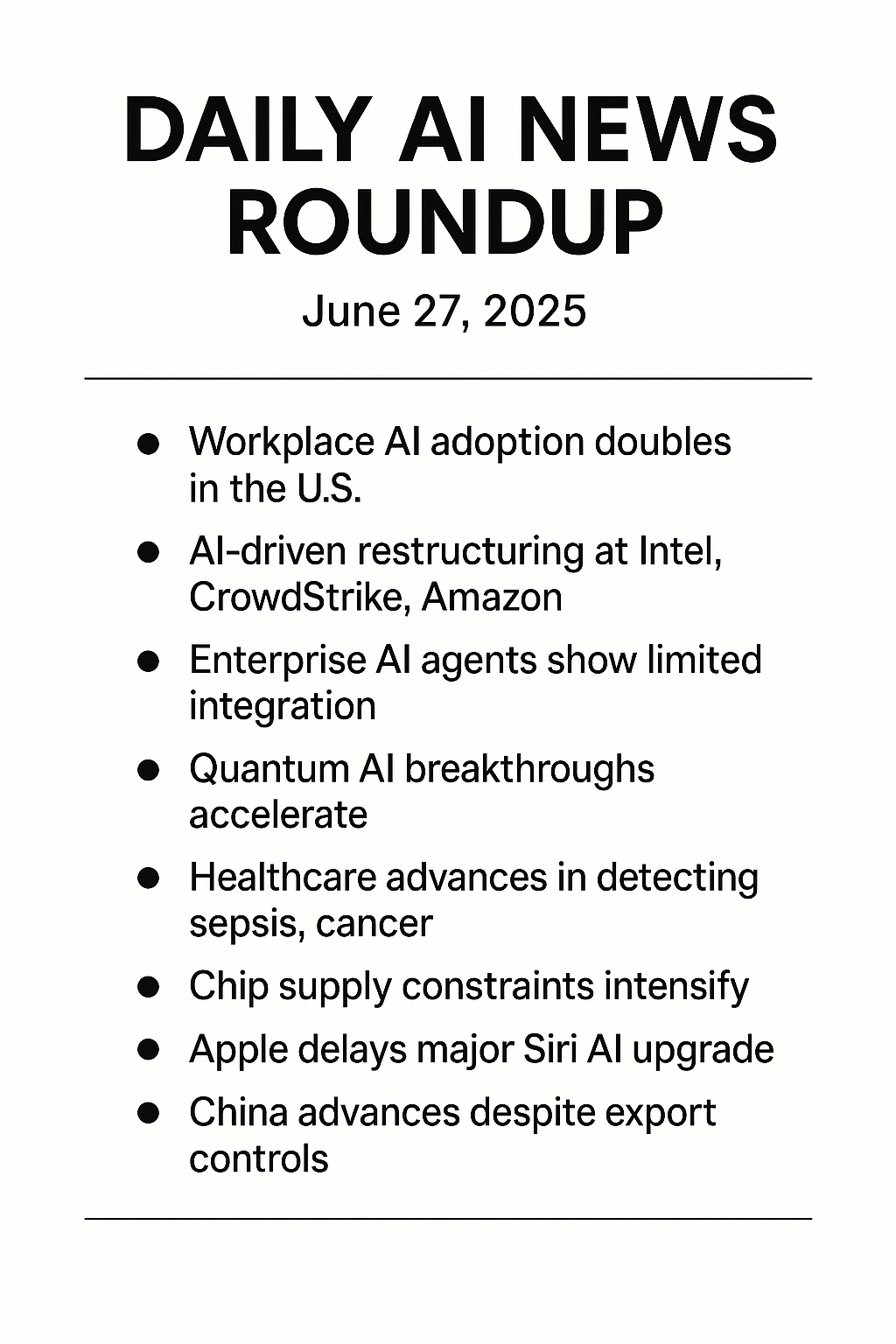🖥️ Workplace AI Revolution Accelerates
A new Boston Consulting Group report shows AI usage among U.S. employees nearly doubled in two years-daily users rose from 4 % to 8 %, weekly users from 11 % to 19 %. Companies integrating AI into workflows report major time savings and sharper decision-making, though 46 % of workers at advanced AI firms worry about job security.
Why this matters: Widespread AI adoption is transforming how we work-but also heightening concerns around reskilling and workforce stability.
✂️ Major Corporate Restructuring Continues
Tech giants are deepening cuts: Intel plans to trim up to 20 % of its foundry staff, CrowdStrike will cut 5 %, and Amazon confirms more AI-driven layoffs ahead. Yet the AI sector employs 97 million globally, as smaller teams leverage AI for complex system oversight in manufacturing and construction.
Why this matters: AI is both displacing roles and creating new opportunities-reshaping labor markets and operational models.
🤖 Enterprise AI Agent Development Shows Promise
Only 13 % of employees report deep integration of AI agents-software programs that autonomously perform tasks using natural-language and tool use-into daily workflows, and just one-third understand how they work. When educated on these agents, employees shift from apprehension to seeing them as collaborative partners.
Why this matters: Clear communication and training around AI agents unlock their potential as "co-workers," not competitors.
⚛️ Quantum Computing Integration Advances
Quantum AI (QAI)-the fusion of quantum computing's parallelism with machine learning-promises to tackle today's computational bottlenecks. Experts anticipate QAI models will deliver exponentially faster data processing and drastically lower energy use compared to classical systems.
Why this matters: Quantum AI could break through current limits on model scale, speed, and sustainability, opening new frontiers in research and industry.
🏥 Healthcare AI Breakthroughs
EU-approved ICU AI systems now predict sepsis hours before symptoms appear. Liquid biopsy monitoring uses AI to detect breast-cancer relapses years in advance by analyzing blood biomarkers. Google-backed SandboxAQ released the SAIR drug-discovery dataset-5.2 million simulated protein-ligand interactions to accelerate R&D.
Why this matters: Early detection and massive data resources are driving a new era of predictive, personalized medicine.
🔌 AI Chip Supply Chain Under Pressure
The semiconductor materials market is projected to swell from $72 billion in 2025 to $96 billion by 2032. Shortages in gallium, germanium and other critical minerals-often sourced from volatile regions-threaten production of AI accelerators, even as cloud providers ramp up spending on GPUs.
Why this matters: Chip bottlenecks risk slowing AI innovation and highlight the need for diversified, resilient supply chains.
🚗 Autonomous Vehicle AI Progress
Tesla's Full Self-Driving (FSD) alpha roadmap promises a 4.5× parameter boost and improved memory efficiency later this year. Software-Defined Vehicles (SDVs) are set to hit 90 % of production by 2029 (vs. 3.4 % in 2021), though GM, VW and Volvo face integration hurdles.
Why this matters: Rapid advances in vehicle AI could redefine mobility-but real-world deployment remains complex and safety-critical.
🍏 Apple's AI Strategy Delays
Apple pushes its long-awaited Siri AI upgrade to Spring 2026 via iOS 26.4, adding context-aware on-device intelligence. Reports suggest Apple may acquire Perplexity AI to bolster search features after missing earlier rollout targets.
Why this matters: On-device AI offers privacy and speed but delays risk ceding ground to competitors already scaling advanced assistants.
🇨🇳 China's AI Resilience & Innovation
Despite U.S. chip export controls, China's DeepSeek R1/V3 and Alibaba's Qwen3 models rival Western counterparts. MiniMax M1, trained on just 512 Nvidia H800 GPUs, matches top-ranked systems. Coordinated public-private efforts and regulatory support drive rapid deployment.
Why this matters: China's "techno-optimism" and infrastructure readiness underscore a strategic path to AI leadership.
⚖️ AI Safety & Regulation Developments
The Singapore Consensus, crafted by 100+ experts from 11 countries, lays out a global AI safety research roadmap covering risk assessment, trustworthy-system design, and post-deployment controls. In Europe, calls grow to fill guidance gaps in the AI Act before the August 2 deadline.
Why this matters: International coordination on safety standards is vital to ensure AI's benefits while mitigating global risks.
🎭 Deepfake Detection & Copyright Updates
Advanced solutions like Deepware Scanner and Google's SynthID use neural-network analysis of facial micro-expressions and audio cues to unmask deepfakes. The U.S. Copyright Office ruled purely AI-generated art ineligible for copyright, though human-curated works remain protected.
Why this matters: Robust detection tools and clear IP rules are essential as synthetic media and AI creation reshape content ecosystems.
🌱 Energy & Sustainability Concerns
Data centers consumed 4.4 % of U.S. electricity in 2023-potentially tripling by 2028 and hitting 20 % of global demand by 2035. Model training runs thousands of GPUs for months, driving huge power draws. Researchers advocate leaner models, green hardware, and cross-discipline collaboration for sustainable AI.
Why this matters: Addressing AI's energy footprint is critical to prevent environmental strain and ensure long-term viability.
🔑 Key Takeaway: Today's news highlights AI's explosive integration-from workplace revolution and quantum leaps to medical breakthroughs and looming resource challenges-underscoring the urgent need for balanced, responsible advancement.



